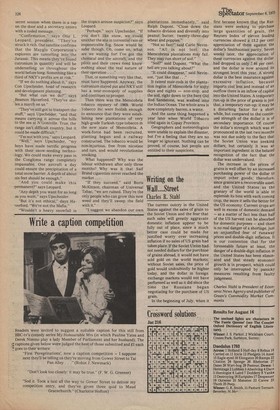Writing on the Wall.. .Street
Charles IL Stahl
The current outcry in the United States against the sales of grain to the Soviet Union and the fear that such sales will greatly aggravate domestic inflation appear to be fully out of place, since a much better case could be made for justified worry over increasing inflation if no sales of US grain had taken place. If the Soviet Union had. not needed dollars for the purchase of grains abroad, it would not have sold gold on the world markets; without Soviet sales, the price of gold would undoubtedly be higher today, and the dollar in foreign exchange markets would not have performed as well as it did since the time the Russians began negotiating for the purchase of US grain.
In the beginning of July, when it first became known that the Russians were seeking to purchase large quantities of grain, the Reuters Index of eleven leading currencies showed a 13.2 per cent appreciation of them against the dollar's Smithsonian parity. Seven weeks later, the appreciation of these currencies against the dollar had dropped to only 7.46 per cent, and the dollar is now around its strongest level this year. A strong dollar is the best insurance against excessive inflation, because imports cost less and instead of an outflow there is an inflow of capital into the United States. A temporary run-up in the price of grains is just that, a temporary run-up; it may be a disturbing factor for a short
while, but compared to the continued strength of the dollar it is of secondary importance. Of course the dollar's strength which was so pronounced in the last two months was not due solely to the fact that
the Soviet Union was seeking dollars; but certainly it was an important ingredient in the belated recognition of the fact that the dollar was undervalued.
The increase in the prices of grains is well offset by an increased purchasing power of the dollar to import other goods; therefore, since grains"are a recoverable asset, and the United States as the granary of the world is able to replenish its bins with each coming crop, the more it sells the better for the US economy. Current crops are well in excess of domestic demand — as a matter of fact less than half of the US harvest can be absorbed for domestic purposes — and there is no real danger of a shortage, just an unjustified fear of runaway prices and double-digit inflation. It
is our contention that for the foreseeable future at least, the danger of a double-digit inflation in the United States has been eliminated and that steady economic
growth is in prospect, which could only be interrupted by panicky measures resulting from faulty judgement.
Charles Stahl is President of Economic News Agency and publisher of Green's Commodity Market Comments


































 Previous page
Previous page